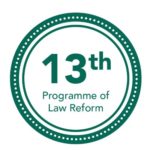Continue reading "Law Reform: Will-making for the modern age"
Law Reform: Will-making for the modern age


Continue reading "Law Reform: Will-making for the modern age"

Continue reading "Wills: A legal rather than moral imperative"

Continue reading "Law Reform: Willing to change?"
The claimant was a friend and business colleague of Philip Hopkins, and the executor and main beneficiary under Mr Hopkins’ will dated 6 June 2014. The will draftsman, a partner in a law firm, attended Mr Hopkins at his home with two members of the firm’s staff who witnessed his signature. During the execution of the will, she noticed that Mr Hopkins was unwell and later that day he was readmitted into hospital. He died ten days later on 19 August 2014, having been diagnosed with unspecified alcoholic liver damage.
The claimant brought a claim to prove the validity of the 2014 wil...
B C
Continue reading "Wills: Crossing a line"
This was a challenge to the formal and substantial validity of the last will of David Poole (the testator) dated 26 December 2012 (the December will) on the grounds of want of due execution, want of knowledge and approval, lack of testamentary capacity and undue influence.
The testator (who died on 19 March 2013) had suffered severe physical and psychiatric injuries following a motorcycle accident in 1985. The December will had been prepared by Mr Everall, the first respondent, who had been the testator’s paid carer/’supporting landlord’ since 1994. The December ...
Kenneth William Jordan (Mr Jordan) died on 4 August 2012 leaving a wife (from whom he was estranged) and two adult children. The claimant was Mr Jordan’s partner during the last years of his life and the first defendant was his daughter from a relationship that predated his marriage. He had previously made a will giving pecuniary legacies to the first defendant and two of his sisters with the residuary estate passing to the claimant. Subsequently, in January 2012, Mr Jordan gave instructions to Mr Mumford (who was his brother-in-law), a solicitor with the firm Melia Mumford, to make a ne...
On 21 May 2010 the deceased died, aged 89, leaving two sons: the appellant and the respondent. The respondent claimed pronouncement in solemn form of an alleged will of the deceased dated 26 July 2005, which divided the deceased’s estate equally between the appellant and the respondent. The appellant challenged the validity of the 2005 will on the basis that the deceased lacked testamentary capacity at the date of its purported execution and on the basis that the deceased did not know and approve of the contents of the same.
In September 2003 social services began to assist with t...

Continue reading "Wills: A textbook claim"

Continue reading "Testamentary Capacity: Facing the facts"